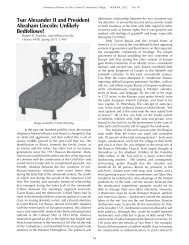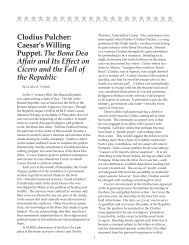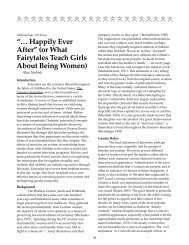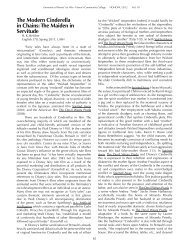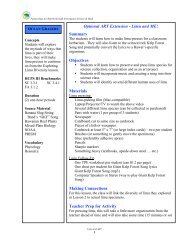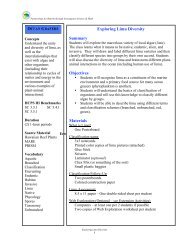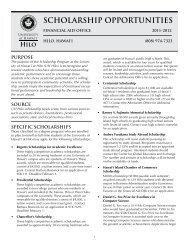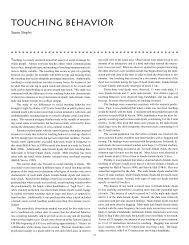A JOURNAL OF ACADEMIC WRITING VOLUME 8
A JOURNAL OF ACADEMIC WRITING VOLUME 8
A JOURNAL OF ACADEMIC WRITING VOLUME 8
You also want an ePaper? Increase the reach of your titles
YUMPU automatically turns print PDFs into web optimized ePapers that Google loves.
poor countries because they want to recover the costs of<br />
their investments in biotechnology. 25<br />
This speaks directly to one of the biggest flaws in the<br />
argument for GMOs as cures for hunger. Florence Wambugu,<br />
the director of the International Service for the Acquisition of<br />
Agri-Biotech Applications, argues that “The African continent,<br />
more than any other, urgently needs agricultural biotechnology,<br />
including transgenic crops, to improve food production.” 26<br />
But GMOs will not “improve food production” if they<br />
can’t thrive there. 27 For GMOs to truly do good, there would<br />
have to be significant investment by the African public sector to<br />
develop technology specifically for free use by African farmers.<br />
If those impoverished countries did start GMO development,<br />
their trade relationships with Europe that rely on producing<br />
GMO-free products would have to either dissolve, or Europe’s<br />
stance on GMOs would have to change.<br />
Food production problems are not the only reasons why<br />
people go hungry. In the article “Genetic Engineering is Not<br />
the Answer,” Sean McDonagh argues that “Hunger and famine<br />
around the world have more to do with the absence of land<br />
reform, social inequality, bias against women farmers and the<br />
scarcity of cheap credit and basic agricultural tools than with<br />
the lack of agribusiness super-seeds.” 28 He cites the example of<br />
Brazil: they are world’s third largest food exporter, yet one fifth<br />
of Brazilians suffer from hunger. The 2002 African crisis is yet<br />
another example of hunger caused by myriad reasons. 29 Noah<br />
Zerbe argues that “. . . [Africa] faced critical food shortages<br />
caused by a complex combination of factors, including climatic<br />
shocks, HIV/AIDS, structural adjustment, debt, collapsing<br />
public services, and poor governance.” 30 It is obvious that<br />
GMOs do not offer a solution to all of these problems. Even<br />
GMO advocates admit that they are not a cure-all. Although<br />
Maarten Chrispeels believes GMOs are an important part of<br />
the solution to hunger, he readily admits that they are “only one<br />
tool.” 31 Gregory E. Pence, a bioethics professor and proponent<br />
of GMOs, artfully explains, “How a tool is used depends on the<br />
person using it: a hammer can build a house or kill someone.<br />
So with GM plants.” 32 It only makes logical sense that GMOs<br />
should be kept out of Africa now while they pose a threat to<br />
the very food security they are supposed to address. With<br />
25 Maarten Chrispeels, “Biotechnology and the Poor,” Plant Physiology 124,<br />
(2000): 2.<br />
26 Wambugu, “Why Africa Needs Agricultural Biotech,” 15.<br />
27 Ibid, 15.<br />
28 Sean McDonagh, “Genetic Engineering Is Not the Answer,” America,<br />
May 2005, 10.<br />
29 Zerbe, “Feeding the Famine? American Food Aid and the GMO Debate<br />
in Southern Africa,” 594 and Clapp, “The Political Economy of Food Aid<br />
in an Era of Agricultural Biotechnology,” 472.<br />
30 Zerbe, “Feeding the Famine? American Food Aid and the GMO Debate<br />
in Southern Africa,” 594.<br />
31 Chrispeels, “Biotechnology and the Poor,” 5.<br />
32 Gregory E. Pence, “Genetically Engineered Foods Will Help Stop World<br />
Hunger,” in Genetically Engineered Foods, ed. Nancy Harris (San Diego,<br />
CA: Greenhaven Press, 2004), 59.<br />
98 - HOHONU Volume 8 2010<br />
their patenting and cost issues, GMOs can only exacerbate the<br />
economic and social causes of hunger in Africa.<br />
If not GMOs, what? As McDonagh explained, there are<br />
many contributors to hunger that have nothing to do with<br />
actual crop yields. While food aid will probably continue to<br />
be needed by Africans, the world can begin to address in more<br />
earnest the underlying causes of hunger in Africa, particularly<br />
HIV/AIDS, residual debt, and failing public services. Instead of<br />
giving as much in-kind aid or cash, the U.S. could donate and<br />
build more efficient agricultural infrastructure like irrigation<br />
and water retention systems. Instead of subsidizing as much<br />
GMO corn, special subsidies could be made for non-GMOs,<br />
once again opening up the European market and ensuring<br />
non-GMO availability for emergency aid. In this way, the U.S.<br />
would still be getting a return on their investment. Many<br />
experts also argue that there are alternative ways to address the<br />
low yield of typical African farms. For example, in the article<br />
“Linking Agricultural Biodiversity and Food Security: The<br />
Valuable Role of Agrobiodiversity for Sustainable Agriculture,”<br />
Lori Ann Thrupp argues that sustainable practices such as<br />
crop rotation, integrated pest management, green manures,<br />
and cover cropping would boost yields while preserving the<br />
local ecology. 33 There are other studies that have found that<br />
intensified organic agriculture has the ability to increase crop<br />
yields without requiring the investment risk that high-input<br />
crops and GMOs need. 34 Essentially, alternatives to GMO<br />
cultivation abound. While the debate over biotechnology plays<br />
out in the developed world, Africa can turn to these alternatives<br />
to improve their food security.<br />
The 2002 food crisis forced underdeveloped Africa to<br />
become embroiled in the world debate over GMOs. Armed<br />
only with data offered to them by the West, Africa had to<br />
make quick and difficult decisions about the future of food and<br />
agriculture there. When several African countries took issue<br />
with the GMO aid, the U.S. accused the E.U. of manipulating<br />
Africa with their fear of biotechnology. The E.U. accused the<br />
U.S. of using food aid as a political tool instead of humanitarian<br />
relief. The African countries claimed that the critical reasoning<br />
for rejecting the aid was to protect their fragile internal and<br />
export economies. Today, almost eight years later, the world<br />
has been able to carefully review this situation. Hindsight and<br />
evidence prove that the African countries were right to refuse<br />
the aid. Patenting laws have not been redesigned to benefit<br />
small African farmers, and few publicly-funded GMOs have<br />
been developed for cultivation in Africa. Europe’s position<br />
33 Lori Ann Thrupp, “Linking Agricultural Biodiversity and Food Security:<br />
The Valuable Role of Sustainable Agriculture,” International Affairs 76,<br />
no. 2 (2000).<br />
34 Catherine Badgley et al., “Organic Agriculture and the Global Food<br />
Supply,” Renewable Agriculture and Food Systems 22, no. 2 (2006): 94<br />
and Brian Halweil, “Can Organic Farming Feed Us All?,” World Watch<br />
19, no. 3 (2006).



